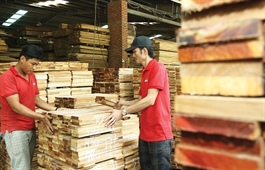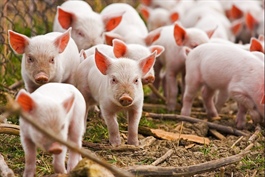Crop production head disproves claim that ‘90% of Vietnamese are eating dirty rice’
Crop production head disproves claim that ‘90% of Vietnamese are eating dirty rice’
Reports that “90 percent of Vietnamese people are eating dirty rice” are wrong, the Department of Crop Production under the Ministry of Agriculture and Rural Development (MARD) affirmed on Saturday afternoon.
The ungrounded information became widespread on social media on Saturday.
The claim was reportedly made by Pham Thai Binh, general director of Trung An Hi-Technology Agriculture JSC based in the Mekong Delta city of Can Tho, during a livestreamed program on Thursday, according to Phu Nu (Women) online newspaper.
“I would like to affirm that 90 percent of Vietnamese people are eating dirty rice, perhaps it is modest to say 90 percent… Many people think that eating dirty rice does not lead to death, and in fact, no one in Vietnam or the world has died right after eating dirty rice. However, in recent years, the rate of people suffering from cancer, diabetes, ... has been increasing, with reasons including the contribution of dirty rice, plant protection drugs accumulating in rice,” Phu Nu quoted Binh as saying, without providing reference data.
Nguyen Nhu Cuong, head of the Department of Crop Production, disproved Binh’s statement during an interview with Tuoi Tre (Youth) newspaper on Saturday afternoon.
“All of [Vietnam’s] medium markets such as the Philippines and Africa or high-end markets such as Europe, the U.S., and Japan have very strict requirements on technical standards, especially food safety and plant protection drug residues. Our products have all passed these markets’ requirements, and Vietnamese rice has been accepted by these countries. How [can someone] say Vietnamese rice is 'dirty rice'?” Cuong said.
Cuong affirmed that there is no such thing as an area in Vietnam that is specialized in producing rice for either export or domestic consumption only, or that Vietnam’s rice is substandard and Vietnamese people are eating dirty rice.
According to Cuong, comments on such an important industry to farmers as rice production must be given based on accurate and scientific data rather than subjective opinions.
“This will affect the success and dynamic development of Vietnam’s rice industry in recent years, damaging the Vietnamese rice’s reputation in the agriculture sector that businesses and farmers have built throughout the past several years,” Cuong said.
According to him, the agriculture sector has invested heavily in science and technology in the field of rice production in recent years.
Vietnam currently has a very good set of rice varieties, with rice quality having not only improved but also overcoming its shortcoming of seasonal factor, the crop production department’s head said.
Farmers are also fully aware of safe farming techniques, while the MARD, research institutes, and the National Center for Agricultural Extension have been working to hand over technical packages to farmers with the goal of lowering input costs, reducing the quantity of seeds, fertilizers, pesticides, and saving water, while still increasing productivity, quality, and prices.
“Thanks to these changes, the rice production industry of Vietnam has made great strides,” Cuong said.
The annual rice cultivation area of the country has reached about 7.3 million hectares, producing up to 43.5 million metric tons of rice per year, not only enough for the domestic consumption of nearly 100 million people but also for export, according to Cuong.
Vietnam exports 6.5 to 6.7 million metric tons of rice to markets in different segments each year, he said.



























